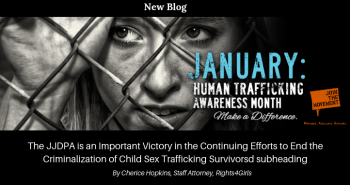January is Human Trafficking Awareness Month

By Cherice Hopkins, Staff Attorney, Rights4Girls
January is Human Trafficking Awareness Month and anti-sex trafficking advocates and juvenile justice advocates have mutual cause to celebrate—the reauthorization of the Juvenile Justice and Delinquency Prevention Act (JJDPA) after 16 years. Before the Act was signed into law last December, it had not been updated since 2002. During that span of time, much knowledge was gained about youth development and best practices for youth safety and treatment. Likewise, the past decade and a half has seen an increase in the understanding of the prevalence and harms of domestic child sex trafficking, including a growing awareness of the need to end our nation’s carceral response to these young survivors of violence. The updated JJDPA plays a critical role in ensuring that this important knowledge is incorporated into our juvenile justice policies and practices, including those that impact trafficking survivors.
It was not until 2005, three years after the JJDPA’s 2002 reauthorization, that federal laws recognized that children in the United States could be victims of child sex trafficking. Historically, these children—particularly girls of color—were not treated as victims of serious crime but were instead deemed complicit in their own victimization. As awareness about child sex trafficking has grown, so too has the understanding that child sex trafficking survivors cannot consent to their own abuse and, therefore, should not be held responsible for crimes related to their trafficking. This understanding has led an increasing number of states to adopt laws that shift legal responses from criminalizing child trafficking victims, to treating them as survivors of child abuse in need of services.
However, there are still states in which youth continue to be arrested on prostitution charges though they are often legally too young to consent to sex. Even when children are protected from prosecution for prostitution offenses, trafficking survivors can still be pushed into the system on other charges (e.g., running away, loitering, curfew and truancy) that are directly tied to their being trafficked.
The updated JJDPA now includes provisions that will help continue to shift states’ responses to trafficking survivors from criminalization to the delivery of services and support. Specifically, the law:
- Requires states receiving funding under the Act to develop policies and procedures to screen for and identify trafficking survivors and divert them to services and programs;
- Requires states receiving funding under the Act to develop a plan to create alternatives to detention for survivors of commercial sexual exploitation;
- Encourages research into methods to improve the identification of and response to trafficking survivors within the juvenile justice system;
- Authorizes prevention programs to address the needs of girls at risk of justice system involvement, including survivors of domestic child sex trafficking; and
- Requires that at least one person on the state advisory group have expertise on trauma and exploitation.
- It is important to note that the law contains other provisions that are crucial to ending the criminalization of trafficking survivors, though they don’t specifically reference trafficked youth. Most notably, the law requires states to develop a plan to create alternatives to detention for youth who commit status offenses (behaviors that are offenses only when committed by a minor) and it also places limits on the ability to detain these youth under a valid court order exception. Such measures are critical to curtailing a punitive response to sex trafficking survivors since many times survivors come into contact with the juvenile justice system for status offenses and may not be identified as having been trafficked.
Additionally, we know that justice system involvement can be traumatic for youth. This is especially true for sex trafficking survivors for whom the conditions of confinement can be triggering. The JJDPA now prohibits the shackling of pregnant girls, addressing a particularly harmful source of trauma within the system. The inclusion of these provisions in the JJDPA is an important victory in the continuing efforts to end the criminalization of child sex trafficking survivors.

